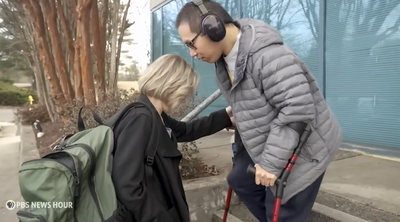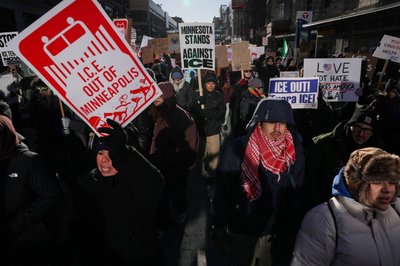NOTE: If you are short on time, watch the video and complete this See, Think, Wonder activity: What did you notice? What did the story make you think? What would you want to learn more about?
SUMMARY
On his first day in office for his second term, President Donald Trump signed an executive order to end universal birthright citizenship and limit it at birth to people with at least one parent who is a permanent resident or citizen. If upheld, Trump’s move could upend a 120-year Supreme Court precedent. Stephanie Sy reports on the history and legacy of that case.
View the transcript of the story.
News alternative: Check out recent segments from the NewsHour, and choose the story you’re most interested in watching. You can make a Google doc copy of discussion questions that work for any of the stories here.
Key terms
birthright citizenship — the principle that anyone born in the U.S. is a U.S. citizen, with the exception of children of foreign officials
executive order — a documented used by the U.S. president that directly manages how the federal government is run but that does not have the force of a law passed by Congress
WARM-UP QUESTIONS
- What does the the executive order issued by the Trump administration say about birthright citizenship?
- When did birthright citizenship become the law through Constitutional amendment?
- Who was Wong Kim Ark, and what role did he play in establishing birthright citizenship?
- How did the Fourteenth Amendment overturn the Dred Scott Supreme Court decision?
- Why does the Trump administration argue that birthright citizenship should not be applied to children of undocumented immigrants?
FOCUS QUESTIONS
- The Fourteenth Amendment was enshrined following the Civil War and established citizenship for formerly enslaved people. Why do you think birthright citizenship for nearly all people born in the U.S. was established in the 14th Amendment of the Constitution?
- What is one fact of history presented in this segment that surprised you, or that you didn't already know?
Media literacy: Who might you talk to to better understand how birthright citizenship has shaped U.S. history?
WHAT STUDENTS CAN DO
Read through the Fourteenth Amendment. Then discuss as a class — how has this amendment shaped life in the United States since its passing? Other than the example of Wong Kim Ark, when in the past has the Fourteenth Amendment been ignored by state officials and legislatures?
Teachers — you may want to assign students a research question as homework: have them identify and describe a Supreme Court decision that established who was considered a U.S. citizen, who was not and what rights were associated with citizenship.
For the latest on the Trump administration's attempts to overturn established rules of birthright citizenship, see these stories. For more on birthright citizenship, check out the following video.
Fill out this form to share your thoughts on Classroom’s resources.





